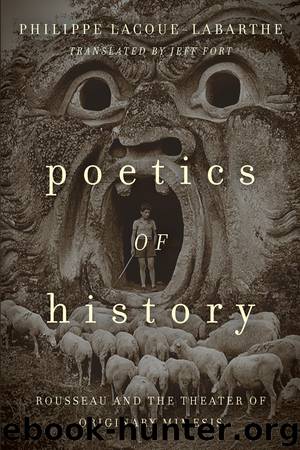Poetics of History by Lacoue-Labarthe Philippe;Fort Jeff;

Author:Lacoue-Labarthe, Philippe;Fort, Jeff;
Language: eng
Format: epub
Publisher: Lightning Source Inc. (Tier 2)
2
At the end of these pages, everything seems finalized. The verdict is not only terrible, it is also irrevocable. Even before Rousseau seeks to confirm it by examples or attempts to administer proofs of it by examining certain tragic subjects (plot and character combined), the sentence comes down, with Aristotle once again providing support:
Thus everything compels us to abandon this vain idea that some wish to give us of the perfection of a form of Theater directed toward public utility. It is an error … to hope that the true relations of things will be faithfully presented in the theater. For, in general [my emphasis], the Poet can only alter these relations in order to accommodate them to the taste of the public. In the comic, he diminishes them and sets them beneath man; in the tragic, he extends them to render them heroic and sets them above humanity. Thus they are never to his measure, and we always see Beings other than our own kind [nos semblables] [my emphasis] in the theater. I add that this difference is so true and so well recognized that Aristotle makes a rule of it in his poetics: Comoedia enim deteriores, Tragoedia meliores quam nunc sont imitari conantur. Here is a well-conceived imitation, which proposes for its object that which does not exist at all and leaves, between defect and excess, that which is as a useless thing! But of what importance is the truth of the imitation, provided the illusion is there? The only object is to excite the curiosity of the public. These productions of wit and craft, like most others, have for their end only applause. When the Author receives it and the Actors share in it, the play has reached its goal, and no other advantage is sought. Now, if the benefit is nonexistent, the harm remains; and since the latter is indisputable, the issue seems to me to be settled. (LA 270)1
But if we look a bit closer here, things are not so simple. And especially not so simple as they are ordinarily thought to be.
Rousseau, in fact, does not condemn imitation as such. He condemns only “poetic,” or “poietic” imitation: meaning any “production,” whether it be “of the mind” or not, having no other aim than to please, in the most dubious sense of the term. If we were presented, at the theater, with “that which is,” “Beings,” like (or as)2 “our fellows [nos semblables],” then the imitation would be “well-conceived [bien entendüe]” and we could then even speak of a “truth of imitation.” But theater (re)presents nothing but illusion, for the simple reason that only illusion (or “fiction”) is capable of “pleasing,” no matter which means are used: laughter or tears. And this provides an immediate explanation of the fact that katharsis is in turn illusory: a relief that is deceptive or perverted, vain or harmful. “If the benefit [le bien] is nonexistent, the harm remains.” But nothing forbids in principle the possibility of a good
Download
This site does not store any files on its server. We only index and link to content provided by other sites. Please contact the content providers to delete copyright contents if any and email us, we'll remove relevant links or contents immediately.
| African | Asian |
| Australian & Oceanian | Canadian |
| Caribbean & Latin American | European |
| Jewish | Middle Eastern |
| Russian | United States |
4 3 2 1: A Novel by Paul Auster(11065)
The handmaid's tale by Margaret Atwood(6866)
Giovanni's Room by James Baldwin(5889)
Big Magic: Creative Living Beyond Fear by Elizabeth Gilbert(4730)
Asking the Right Questions: A Guide to Critical Thinking by M. Neil Browne & Stuart M. Keeley(4591)
On Writing A Memoir of the Craft by Stephen King(4220)
Ego Is the Enemy by Ryan Holiday(3999)
Ken Follett - World without end by Ken Follett(3980)
The Body: A Guide for Occupants by Bill Bryson(3813)
Bluets by Maggie Nelson(3721)
Adulting by Kelly Williams Brown(3678)
Guilty Pleasures by Laurell K Hamilton(3591)
Eat That Frog! by Brian Tracy(3521)
White Noise - A Novel by Don DeLillo(3439)
The Poetry of Pablo Neruda by Pablo Neruda(3370)
Alive: The Story of the Andes Survivors by Piers Paul Read(3317)
The Bookshop by Penelope Fitzgerald(3234)
The Book of Joy by Dalai Lama(3225)
Fingerprints of the Gods by Graham Hancock(3218)
